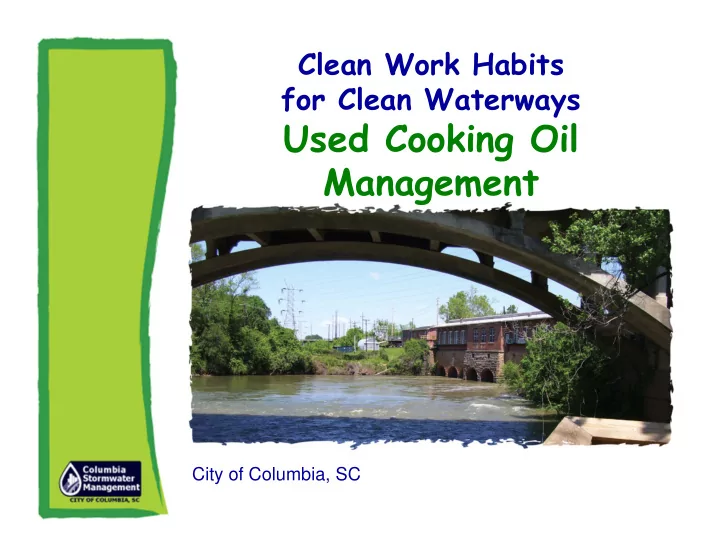

Clean Work Habits for Clean Waterways Used Cooking Oil Management City of Columbia, SC
Why “Good Housekeeping”? To keep pollution from going down stormdrains Stormdrains empty directly into waterways – creeks, streams, rivers
Waterways Are Important We don’t want polluted waterways because: People swim in them People fish from them People drink from them Plants and animals live in them
Why are we addressing Used Cooking Oil? There are many restaurants in the City which have the need for disposal of used cooking oil Used cooking oil is commonly stored outdoors in bulk containers Management of this waste is inherently messy, resulting in spillage The oil spillage causes impacts to the City’s stormwater system.
Planning and Setup Choosing a good location for used oil containers: As far as possible from storm drains or waterways Easily accessible for both kitchen staff and disposal pickup Indoors or under cover is preferable Near dumpsters is common
Planning and Setup Access to containers Staff should be able to easily reach the container to pour oil Containers should remain closed when not in use It may be necessary to place locks on containers Each restaurant should have its own containers (sharing is discouraged).
Planning and Setup Transporting from kitchen to container Use buckets, pans, etc. that have lids to prevent spillage during transport When transporting, leave room for “sloshing.” Transport oil in manageable quantities If necessary, provide carts to help with transport
Container Maintenance Containers should be checked often for leaks Any leaking or otherwise damaged containers should be replaced or repaired immediately Frequently wipe down spilled/splashed oil from the outside of the container Keep grit screens/bars cleaned to prevent spillage
Container Maintenance Lids should remain closed when the container is not in use. This is a very common mistake Frequently check the level of the oil in the container Have the container emptied before it is full.
Spill Management Spills should be cleaned up as soon as possible Cleanup should use as few liquids as possible Dry cleanup (oil dry/kitty litter) – sweep up and dispose in garbage Mop and bucket – empty mop water into a sanitary sewer drain (usually the mop sink).
Spill Management Thick grease buildup can be scraped, swept and placed in the garbage Do not pressure wash Though this is a common cleanup choice, pressure washing tends to do more harm than good. Do not rinse or use any method involving lots of fluid. Capturing and disposing of cleanup fluid can be very difficult and expensive
Training and Communication Be sure that all employees involved with oil disposal know the proper procedures Encourage employees to inform their supervisor if there are any problems with used oil management
Questions? If you have questions after today, please contact: Mike Jaspers Office: 803-545-0076 Cell: 803-730-4021 Email: mjjaspers@columbiasc.net
Recommend
More recommend